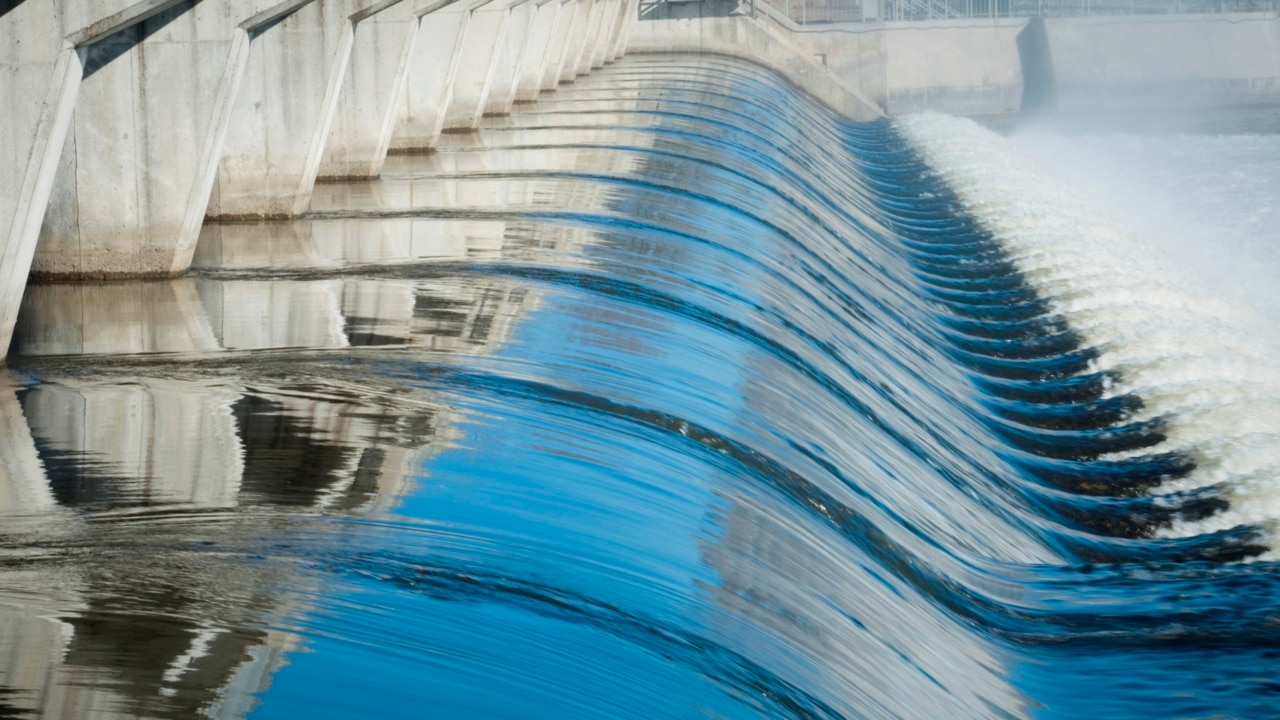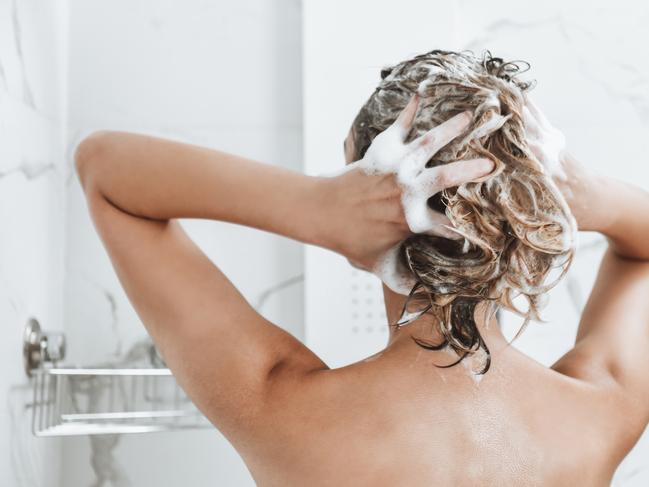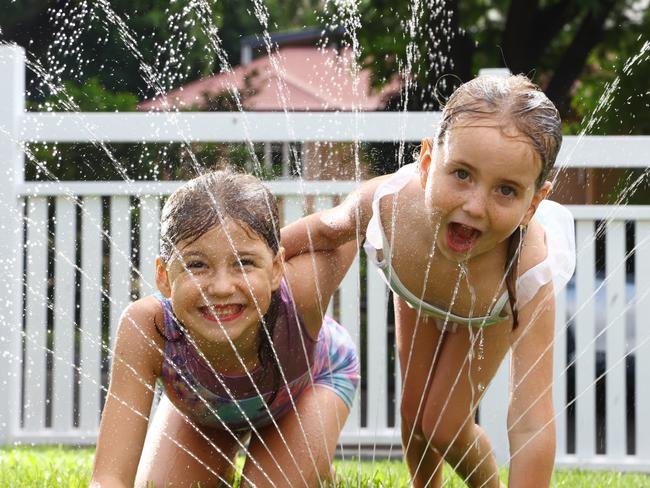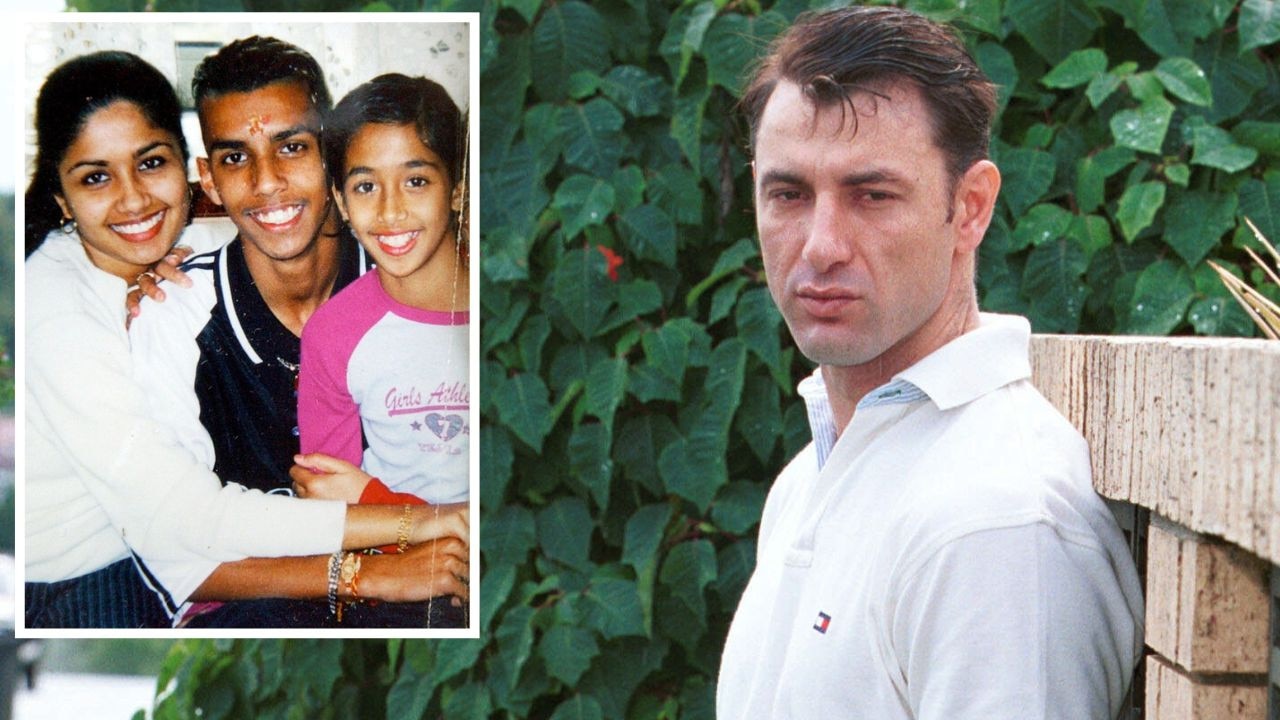What is hard water and is it wrecking your hair?
Does it seem like every day is a bad hair day? Can’t get your shower screen clean? It might have everything to do with Brisbane’s water.

QLD News
Don't miss out on the headlines from QLD News. Followed categories will be added to My News.
Brisbane’s water is giving shower screens “glass cancer,” experts say, as a hair guru reveals exactly what the high mineral content in the water is doing to our locks.
Brisbane, and Queensland generally, has some of the hardest water in the nation.
Water hardness is determined by the level of naturally-occurring calcium and magnesium in the water, with levels measuring between 60-200mg per litre considered hard.
The levels of calcium and magnesium in water depend on where the water is collected from as water picks up additional minerals as it flows through creek beds over soil and rock prior to being processed at treatment plants and distributed to households.
While neither hard nor soft water has negative impacts on health, some experts say hard water is slightly more beneficial due to the added calcium and magnesium ingested.
“If we drink water and there’s not enough minerals in it, it can actually pull calcium out of our bones,” Griffith University associate professor in microbiology Helen Stratton said
However, while hard water is completely safe to drink, it does impact kitchen appliances and bathroom wet areas due to calcium build up creating scaling.
The build-up can become permanent or is more difficult to remove over time due to a condition coined by plumbers as “glass cancer”.

“If you put it under a microscope, it’s actually eating the glass because glass is actually a liquid,” Ms Stratton said.
“That’s why in really old houses the glass is thicker at the bottom.”
Hard water can also impact hair quality and cause colour stripping in our tresses.
Evo Hair education head Jay Kownacki said mineral build-up can have a “massive” effect on hair, particularly for those who colour their hair or have curly and wavy hair.
“Hard water can have an affect on colour penetration and results in the salon but minerals in water can also physically change the colour in hair at home,” he said.
“Curl patterns in hair also get weighed down by mineral build up, so wavy, curly and coily hair can be affected as mineral water make its dull, limp and dry.”
Dr Ulrich Baumgartner from the University of Queensland’s School of Biomedical Sciences, said the alternative, “too soft” water, could also make it more difficult to rinse off shampoos and soaps.
“The more hardness you have, the more shampoo and soap you need but the other side of that is some places have really soft water it’s hard to wash the soap and shampoo off again,” he said.
“It’s two sides, medium hardness is good.”
Michelle Cull from Urban Utilities, which manages some of the South East’s water infrastructure, said water was regularly tested for hardness.

“The water hardness in Brisbane is around 130mg/L which is well within the aesthetic limits of the Australian Drinking Water Guidelines,” she said.
“Harder water simply means your soap or shampoo won’t lather as easily and you may also notice scaling on your plumbing fixtures or appliances.
“Scaling can occur in your kettle as mineral salts are left behind after the water boils.”
Ms Stratton said during treatment water was first monitored for health impacts and then aesthetically treated for things like taste and smell.
“Hard water falls under the aesthetics,” she said.
“There’s good and bad in both and they both need to be monitored as soft water needs to have minerals put in otherwise the water would pull minerals out of the pipes, deteriorating them and we’d have to replace them and that’s expensive,” she said.
“And hard water lays down calcium and magnesium in pipes and build-up scale in the pipes, and then bacteria can adhere to that and that makes it harder to manage water once it leaves the treatment plant and travels to your house.”
HARD WATER EXPLAINED
Hardness CaCO3 measurement:
CaCO3 is Calcium carbonate: A chemical compound consisting of one atom of calcium, one of carbon, and three of oxygen that is the major constituent of limestone, marble, chalk, eggshells, bivalve shells, and corals.
CaCO3 is caused by calcium and magnesium salts, making water difficult to lather.
According to the current Australian Drinking Water Guidelines the following is considered various levels or measurements of hard water.
60-200 mg/L CaCO3 – good quality (this is the level water is processed within)
200-500 mg/L CaCO3 – increasing scaling problems
>500 mg/L CaCO3 – severe scaling
How does hard or soft water form?
Hard and soft water is defined by the level of calcium carbonate and magnesium levels it contains.
These minerals are collected, or absorbed, in water as it travels naturally over land, through creeks and over rocks into our collection points, usually dams.
The geology of different areas in Australia is vastly different meaning water from different states and the regions within those states contains different mineral levels.
When water is tested at water treatment plants, the calcium and magnesium levels are noted, and this is how we know where hard and soft water (roughly) comes from.
Is hard water safe to drink?
Completely. Dr Ulrich says minerals are extremely healthy.
“They’re good for you and if you have no minerals in the water they actually starts to leach out the minerals in your body,” he said.
“Pure water is quite aggressive in leaching out other minerals in your body.”
This means that if water had no minerals at all, water consumed by the human body would then absorb or “leach” minerals from it, rather than humans metabolising the minerals after consumption.
Does hard water affect the taste?
No, hard water does not impact taste however, the aesthetic part of water treatment does.
When water is collected from dams or ground collection points to water treatment plants it undergoes various cleaning processes.
The water is tested for harmful bacteria, cleaned and then processed for transport through pipes to homes.
What does affect the taste is other chemicals added to water to enhance its aesthetic (smell and taste) before it is transported.
Different places use different disinfectant chemicals depending on the quality of water that is collected from that area, and those chemicals are what create differences in tastes and smells when you travel from place to place.
Ms Stratton said chlorine and ammonia are used as disinfectant in South East Queensland water treatment plants which creates a distinctive smell for interstate visitors.
“And chlorine is better at stopping the microbes from sticking to pipe walls,” she said.
“Noosa for example isocyanate their water, which creates a totally different taste again.
“There are also bacteria that produce different tastes, like Geosmin and Methyl-Isoborneol (MIB), they are two compounds which are prominent in Gold Coast and Adelaide water.
“They have absolutely no harm but it makes the water taste and smell muddy.”
How is hard water treated?
Hard water is not necessarily “treated” rather it is measured for aesthetic purposes.
For aesthetic purposes, Australian Drinking Water Guidelines recommend hard water measures between 60 and 200 milligrams per litre, however this does not impact the safety or drinkability of the water in any way.
Dr Ulrich explains that calcium carbonate (CaCO3) actually makes water more stable for transport between treatment plants and homes.
He said hard water is therefore usually “left alone” while soft water will have minerals added to it.
“When we do reverse osmosis, which recycling and desalination plants use, it strips all the minerals and then before we drink it we have to add all minerals back in,” he said.
“But if you want to take out the hardness of the water you’re going to waste 20-30 per cent of your water.
“This is because the minerals get concentrated in one stream which is then wasted.”
Dr Ulrich said there is not much price disparity between the cost of processing soft and hard water.
“Hard needs a bit more acid or base to treat so has a slight operational impact,” he said.
“But neither affect water quality.”
Ms Stratton agreed hard water was slightly harder to manage than soft water purely because its easier to add things than take them out.
Why does hard water make my hair frizzy?
Hard water has slighter higher levels of calcium than soft water. This can result in a lesser ability to lather soaps and shampoos, rendering a “normal” dose less effective.
The lack of lather, combined with Queensland’s higher humidity levels and mineral build up in water can result in frizzy or dry hair.
Additional minerals in shower water also have the ability to change the colour of dyed hair.
Education head at Evo Hair Jay Kownacki recommends using a cleansing shampoos once a week or once a fortnight depending on the dryness and colour.
He aid industry experts were now working on formulating specific products that target chemicals found in treated water like chlorine but in the meantime, Queenslanders having trouble with their hair quality should invest in shower filters as well as deep cleansing shampoos and colour conditions.
Why does hard water create limescale in my bathroom and kettle?
Over time the calcium present in hard water will stick to metal surfaces and create a build up or coating in some regular-use kitchen appliance like kettles or on shower surfaces that are commonly wet.
If the traces of calcium are not removed during regular cleaning, Queenslanders may notice white-ish stains on metal and glass surfaces due to the leftover calcium.
This is completely normal and safe. It will not harm you and objects are still safe to use or drink from.
Can I get rid of hard water in my house?
Absolutely. Water filters installed at home in sinks, showers and coffee machines or kettles can assist in removing additional calcium from hard water.
Filters won’t remove all calcium as it hardens over time and is a solid-state mineral, but they can significantly reduce it.
Using mobile filters or a more expensive filtration system should result in less scale cleaning and longer lifespan of appliances like kettles.
But Ms Stratton says removing all minerals is unsafe, making water unhealthy for consumption.
Dr Ulrich recommended Queenslanders use vinegar or stronger commercial grade products to reduce scale from wet areas and decalcification treatments on coffee machines.
However, if calcium is left on metal surfaces, it can result in irreversible corrosion.


